Emory大學的食物展
Emory CHN 401
楊涵涵(Han-Han Yang) & 鄒昶業(Chang-Ye Chou)

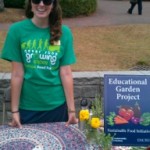
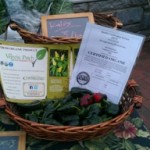
A: 你覺得這次Emory大學的食物展辦得怎麼樣?
B: 雖然很熱也很擠, 我還是很喜歡. 你喜歡嗎?
A: 我也很喜歡, 因為我吃了很多好吃的東西, 但是我沒有學到很多, 因為吃的東西太多讓我分心. 你有學到什麼新的東西嗎?
B: 有啊! 我學到一種不同的農業方式, 叫做永續農業. 持續農業是一種對消費者和動物很健康的耕種方式. 這種方式不會傷害環境, 對工人有人利, 且尊重動物, 並提供農夫合理的報酬, 也支持和改善農村的社區.
A: 這個聽起來跟有機農業一模一樣. 連吃起來的味道也一模一樣! 這兩個方式有什麼不同嗎?
B: 當然有阿! 唯一的差別是每一年有機的食物一定要被政府同意的團體發給證照. 兩者的耕種方法也是一樣的. 但是, 因為持續食物不需要領取證照, 消費者只能信任這些持續農業的農夫們.
A: 那麼照你說的話, 雖然食物不是持續的, 農夫還是可以貼放持續的標籤在他們的食物上. 真可怕!
B: 對阿. 所以呢, 你覺得食物展的食物怎麼樣呢? 持續食物跟產業生產的食物有什麼不同?
A: 我嘗試了一些瓜醋湯, 意大利麵和冰淇淋. 我嘗試的都是持續農業生產的. 全部都明顯的比產業食物好吃, 也比較健康.
B: 你說的對! 持續農業不用殺蟲劑和其它有害的化學物品. 所以食物吃起來味道比較好. 持續食物也有比較也含有比較多的抗氧化劑, 可以幫助防癌, 也有比較多的維他命和養分. 還有, 持續農業的農夫水土保持做得比較好, 也不注射荷爾蒙在動物和農作物裡面, 減少礦物燃料的油耗, 和在當地賣食物, 避免對環境和人類造成不好的公共污染.
A: 真的嗎?! 持續農業跟產業農業比較起來有很多好處. 你知不知道, 在美國應為不衛生的工作條件在工廠和屠宰場引起了食物中毒, 造成了七千六百萬人生病, 三十二萬五千人住院, 和五千人死亡? 產業農業的農夫只關心如何獲取最大利潤, 而不重視人的生體健康和環境,使用殺蟲劑提高了致癌機會及提高和空氣污染.
B: 我真不相信! 所以我們應該吃跟多的持續食物. 我覺得政府應該提供公眾更多的資料說明為什麼持續農業有比較多的好處. 政府的支持會給產業農夫比較多的誘因停止使用不當的耕種方式.
A: 照你所說, 我們應該購買持續食物, 因為比較健康, 對動物好, 也保護環境, 不會消耗礦物燃料, 還有, 最重要的是, 味道比較好, 從現在開始, 我一定會開始購買持續食物!
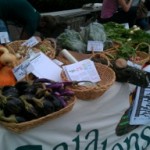
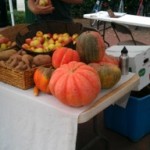
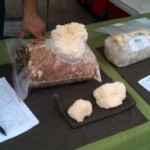
词汇(Vocabulary)
| 1. 永續農業 |
yǒng xù nóng yè |
sustainable agriculture (n.) |
| 例句:我學到一種不同的農業方式, 叫做永續農業. |
Example: I learned about a different agriculture method, called sustainable agriculture.
2. 消費者 xiāo fèi zhě consumer (n.)
例句:永續農業是一種對消費者和動物很健康的耕種方式.
Example: Sustainable agriculture is healthy for consumers and animals.
3. 報酬 bào chóu wage; reward (n.)
例句:這種方式提供農夫合理的報酬.
Example: This method of agriculture provides a fair wage to the farmer.
4. 有機農業 yǒu jī nóng yè organic agriculture (n.)
例句:這個聽起來跟有機農業一模一樣.
Example: That sounds exactly like organic agriculture.
5. 團體 tuán tǐ organization (n.)
例句:唯一的差別是每一年有機的食物一定要被政府同意的團體發給證照.
Example: The only difference is that organic foods have to be certified by a government approved organization every year.
6. 耕種方法 gēng zhòng fāng fǎ agriculture method (n.)
例句:兩者的耕種方法也是一樣的.
Example: Agriculture methods are the same for both.
7. 標籤 biāo qiān label (n.)
例句:農夫還是可以貼放永續的標籤在他們的食物上.
Example: Farmers can label their foods as sustainable even when they are not.
8. 嘗試 cháng shì to try, sample (v.)
例句:我嘗試了一些瓜醋湯͵ 意大利麵和冰淇淋.
Example: I tried some squash soup with vinegar, pasta, and ice cream.
9. 明顯 míng xiǎn definitely; obviously (adv.)
例句:全部都明顯的比一般產業食物好吃.
Example: They were definitely better tasting than industrial foods.
10. 健康 jiàn kāng healthy (adj.)
例句:照你所說, 我們應該購買永續食物,因為比較健康, 對動物好, 也保護環境, 不會消耗礦物燃料, 還有, 最重要的是味道比較好.
Example: From what you are saying, we should buy sustainable foods because it is healthier, better for the animals, protects the environment, does not consume fossil fuels, and most importantly, it tastes better.
11. 殺蟲劑 shā chóng jì pesticide (n.)
例句:永續農業不使用殺蟲劑和其它有害的化學物品.
Example: Sustainable agriculture does not use pesticides and other harmful chemicals.
12. 抗氧化劑 kàng yǎng huà jì antioxidants (n.)
例句:永續食物也含有比較多的抗氧化劑.
Example: Sustainable foods also contain more antioxidants.
13. 癌 ái cancer (v.)
例句:永續食物也含有比較多的抗氧化劑, 可以幫助防癌.
Example: Sustainable foods also contain more antioxidants, which helps fight cancer.
14. 維他命 wéi tā mìng vitamin (n.)
例句:永續食物有比較多的維他命.
Example: Sustainable foods contain more vitamins.
15. 注射 zhù shè to inject (v.)
例句:永續農業的農夫水土保持做的比較好, 也不注射荷爾蒙在動物和農作物裡面.
Example: Sustainable farmers conserve water and soil and do not inject hormones into the animals and plants.
16. 荷爾蒙 hé ěr méng hormone (n.)
例句:永續農業的農夫水土保持做的比較好, 也不注射荷爾蒙在動物和農作物裡面.
Example: Sustainable farmers conserve water and soil and do not inject hormones into the animals and plants.
17. 礦物燃料的油耗 kuàng wù rán liào de yóu hào fossil fuel consumption (n.)
例句:永續農業的農夫減少礦物燃料的油耗, 並且在當地賣食物, 避免對環境和人類造成不好的公共污染.
Example: Sustainable farmers minimize fossil fuel consumption and sell foods locally, which prevents transportation pollution that is harmful to the environment and humans.
18. 屠宰場 tú zǎi chǎng slaughterhouse (n.)
例句:在美國因為工廠和屠宰場不衛生的條件, 引起了食物中毒.
Example: In the U.S., unsanitary working conditions in factories and slaughterhouses cause food-borne illnesses.
19. 公眾 gōng zhòng public (n.)
例句:我覺得政府應該提供公眾更多的資料說明為什麼永續農業有比較多的好處.
Example: I think the government should provide more information to the public about the benefits of sustainable agriculture.
20. 誘因 yòu yīn incentive (n.)
例句:政府的支持會給一般產業農夫比較多的誘因, 而停止使用不當的耕種方式.
Example: This support from the government will provide more incentives to industrial farmers to stop using harmful methods.
讨论的问题:
1. 什么是“永续农业”?
What is “sustainable agriculture”?
2. 永续农业与有机农业的差别是什么?
What is the different between sustainable agriculture and organic agriculture?
3. 持续农业生产的食物有什么优点?
What are the strengths of sustainable food?
4. 我们可以到哪儿买到有机食品?你喜欢吃有机食物吗?为什么?
Where can we buy organic food? Do you like to eat organic food? Why or why not?
Transcript:
A: What did you think about the Food Fair at Emory University?
B: Even though it was really hot and crowded, I liked it a lot. Did you like it too?
A: I also really liked it because I got to eat, but I didn’t learn much because I was too distracted by the food. Did you learn anything new?
B: Yes, I learned about a different agriculture method, called sustainable agriculture. Sustainable agriculture is healthy for consumers and animals. This method of agriculture does not harm the environment, is humane for workers, respects animals, provides a fair wage to the farmer, and supports and makes rural communities better.
A: That sounds exactly like organic agriculture. They even taste the same! Is there even a difference between the two methods?
B: Of course there is! The only difference is that organic foods have to be certified by a government approved organization every year. Agriculture methods are the same for both; however, because sustainable foods do not have to be certified, the consumer must be willing to trust the sustainable farmer.
A: So, what you mean is that the farmers can label their foods as sustainable even when they are not? How scary!
B: Yeah, it is. So what did you think of the food at the Food Fair? How does sustainable food compare to industrially produced food?
A: I tried some squash soup with vinegar, some pasta, and some ice cream. Everything I tried was all produced through sustainable agriculture. They were definitely better tasting than industrial foods, and they are also healthier.
B: That’s correct! Sustainable agriculture does not use pesticides and other harmful chemicals to artificially enhance the taste. Sustainable foods also contain more antioxidants, which helps fight certain types of cancer, and they contain more vitamins and nutrients. Not to mention, sustainable farmers conserve water and soil, do not inject hormones into the animals and plants, minimize fossil fuel consumption, and sell foods locally, which prevents transportation pollution that is harmful to the environment and humans.
A: Really?! There are so many benefits to sustainable agriculture compared to industrial agriculture. Did you know that because of unsanitary working conditions in factories and slaughterhouses, food borne illness in the U.S. sickens 76 million people, causes 325,000 to be hospitalized, and kills 5,000 people every year? Industrial farmers only care about maximizing profits and disregard human health and the environment, causing elevated cancer risks and pollution by using pesticides.
B: I can’t believe it! And this is why we should start eating more sustainable food. I think the government should provide more information to the public about the benefits of sustainable agriculture. This support from the government will provide more incentives to industrial farmers to stop using harmful methods.
A: From what you are saying, we should buy sustainable foods because it is healthier, better for the animals, protects the environment, does not consume fossil fuels, and most importantly, it tastes better. From now on, I am definitely going to start consuming sustainable food!
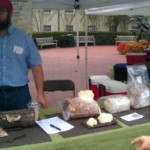

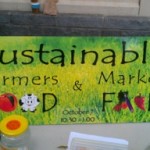
Emory大學的食物展
Emory CHN 401
楊涵涵(Han-Han Yang) & 鄒昶業(Chang-Ye Chou)
A: 你覺得這次Emory大學的食物展辦得怎麼樣?
B: 雖然很熱也很擠, 我還是很喜歡. 你喜歡嗎?
A: 我也很喜歡, 因為我吃了很多好吃的東西, 但是我沒有學到很多, 因為吃的東西太多讓我分心. 你有學到什麼新的東西嗎?
B: 有啊! 我學到一種不同的農業方式, 叫做永續農業. 持續農業是一種對消費者和動物很健康的耕種方式. 這種方式不會傷害環境, 對工人有人利, 且尊重動物, 並提供農夫合理的報酬, 也支持和改善農村的社區.
A: 這個聽起來跟有機農業一模一樣. 連吃起來的味道也一模一樣! 這兩個方式有什麼不同嗎?
B: 當然有阿! 唯一的差別是每一年有機的食物一定要被政府同意的團體發給證照. 兩者的耕種方法也是一樣的. 但是, 因為持續食物不需要領取證照, 消費者隻能信任這些持續農業的農夫們.
A: 那麼照你說的話, 雖然食物不是持續的, 農夫還是可以貼放持續的標籤在他們的食物上. 真可怕!
B: 對阿. 所以呢, 你覺得食物展的食物怎麼樣呢? 持續食物跟產業生產的食物有什麼不同?
A: 我嘗試了一些瓜醋湯, 意大利麵和冰淇淋. 我嘗試的都是持續農業生產的. 全部都明顯的比產業食物好吃, 也比較健康.
B: 你說的對! 持續農業不用殺蟲劑和其它有害的化學物品. 所以食物吃起來味道比較好. 持續食物也有比較也含有比較多的抗氧化劑, 可以幫助防癌, 也有比較多的維他命和養分. 還有, 持續農業的農夫水土保持做得比較好, 也不注射荷爾蒙在動物和農作物裡面, 減少礦物燃料的油耗, 和在當地賣食物, 避免對環境和人類造成不好的公共污染.
A: 真的嗎?! 持續農業跟產業農業比較起來有很多好處. 你知不知道, 在美國應為不衛生的工作條件在工廠和屠宰場引起了食物中毒, 造成了七千六百萬人生病, 三十二萬五千人住院, 和五千人死亡? 產業農業的農夫隻關心如何獲取最大利潤, 而不重視人的生體健康和環境,使用殺蟲劑提高了致癌機會及提高和空氣污染.
B: 我真不相信! 所以我們應該吃跟多的持續食物. 我覺得政府應該提供公眾更多的資料說明為什麼持續農業有比較多的好處. 政府的支持會給產業農夫比較多的誘因停止使用不當的耕種方式.
A: 照你所說, 我們應該購買持續食物, 因為比較健康, 對動物好, 也保護環境, 不會消耗礦物燃料, 還有, 最重要的是, 味道比較好, 從現在開始, 我一定會開始購買持續食物!
詞匯(Vocabulary)
1. 永續農業 yǒng xù nóng yè sustainable agriculture (n.)
例句:我學到一種不同的農業方式, 叫做永續農業.
Example: I learned about a different agriculture method, called sustainable agriculture.
2. 消費者 xiāo fèi zhě consumer (n.)
例句:永續農業是一種對消費者和動物很健康的耕種方式.
Example: Sustainable agriculture is healthy for consumers and animals.
3. 報酬 bào chóu wage; reward (n.)
例句:這種方式提供農夫合理的報酬.
Example: This method of agriculture provides a fair wage to the farmer.
4. 有機農業 yǒu jī nóng yè organic agriculture (n.)
例句:這個聽起來跟有機農業一模一樣.
Example: That sounds exactly like organic agriculture.
5. 團體 tuán tǐ organization (n.)
例句:唯一的差別是每一年有機的食物一定要被政府同意的團體發給證照.
Example: The only difference is that organic foods have to be certified by a government approved organization every year.
6. 耕種方法 gēng zhòng fāng fǎ agriculture method (n.)
例句:兩者的耕種方法也是一樣的.
Example: Agriculture methods are the same for both.
7. 標籤 biāo qiān label (n.)
例句:農夫還是可以貼放永續的標籤在他們的食物上.
Example: Farmers can label their foods as sustainable even when they are not.
8. 嘗試 cháng shì to try, sample (v.)
例句:我嘗試了一些瓜醋湯͵ 意大利麵和冰淇淋.
Example: I tried some squash soup with vinegar, pasta, and ice cream.
9. 明顯 míng xiǎn definitely; obviously (adv.)
例句:全部都明顯的比一般產業食物好吃.
Example: They were definitely better tasting than industrial foods.
10. 健康 jiàn kāng healthy (adj.)
例句:照你所說, 我們應該購買永續食物,因為比較健康, 對動物好, 也保護環境, 不會消耗礦物燃料, 還有, 最重要的是味道比較好.
Example: From what you are saying, we should buy sustainable foods because it is healthier, better for the animals, protects the environment, does not consume fossil fuels, and most importantly, it tastes better.
11. 殺蟲劑 shā chóng jì pesticide (n.)
例句:永續農業不使用殺蟲劑和其它有害的化學物品.
Example: Sustainable agriculture does not use pesticides and other harmful chemicals.
12. 抗氧化劑 kàng yǎng huà jì antioxidants (n.)
例句:永續食物也含有比較多的抗氧化劑.
Example: Sustainable foods also contain more antioxidants.
13. 癌 ái cancer (v.)
例句:永續食物也含有比較多的抗氧化劑, 可以幫助防癌.
Example: Sustainable foods also contain more antioxidants, which helps fight cancer.
14. 維他命 wéi tā mìng vitamin (n.)
例句:永續食物有比較多的維他命.
Example: Sustainable foods contain more vitamins.
15. 注射 zhù shè to inject (v.)
例句:永續農業的農夫水土保持做的比較好, 也不注射荷爾蒙在動物和農作物裡面.
Example: Sustainable farmers conserve water and soil and do not inject hormones into the animals and plants.
16. 荷爾蒙 hé ěr méng hormone (n.)
例句:永續農業的農夫水土保持做的比較好, 也不注射荷爾蒙在動物和農作物裡面.
Example: Sustainable farmers conserve water and soil and do not inject hormones into the animals and plants.
17. 礦物燃料的油耗 kuàng wù rán liào de yóu hào fossil fuel consumption (n.)
例句:永續農業的農夫減少礦物燃料的油耗, 並且在當地賣食物, 避免對環境和人類造成不好的公共污染.
Example: Sustainable farmers minimize fossil fuel consumption and sell foods locally, which prevents transportation pollution that is harmful to the environment and humans.
18. 屠宰場 tú zǎi chǎng slaughterhouse (n.)
例句:在美國因為工廠和屠宰場不衛生的條件, 引起了食物中毒.
Example: In the U.S., unsanitary working conditions in factories and slaughterhouses cause food-borne illnesses.
19. 公眾 gōng zhòng public (n.)
例句:我覺得政府應該提供公眾更多的資料說明為什麼永續農業有比較多的好處.
Example: I think the government should provide more information to the public about the benefits of sustainable agriculture.
20. 誘因 yòu yīn incentive (n.)
例句:政府的支持會給一般產業農夫比較多的誘因, 而停止使用不當的耕種方式.
Example: This support from the government will provide more incentives to industrial farmers to stop using harmful methods.
討論的問題:
1. 什麼是“永續農業”?
What is “sustainable agriculture”?
2. 永續農業與有機農業的差別是什麼?
What is the different between sustainable agriculture and organic agriculture?
3. 持續農業生產的食物有什麼優點?
What are the strengths of sustainable food?
4. 我們可以到哪兒買到有機食品?你喜歡吃有機食物嗎?為什麼?
Where can we buy organic food? Do you like to eat organic food? Why or why not?
Transcript:
A: What did you think about the Food Fair at Emory University?
B: Even though it was really hot and crowded, I liked it a lot. Did you like it too?
A: I also really liked it because I got to eat, but I didn’t learn much because I was too distracted by the food. Did you learn anything new?
B: Yes, I learned about a different agriculture method, called sustainable agriculture. Sustainable agriculture is healthy for consumers and animals. This method of agriculture does not harm the environment, is humane for workers, respects animals, provides a fair wage to the farmer, and supports and makes rural communities better.
A: That sounds exactly like organic agriculture. They even taste the same! Is there even a difference between the two methods?
B: Of course there is! The only difference is that organic foods have to be certified by a government approved organization every year. Agriculture methods are the same for both; however, because sustainable foods do not have to be certified, the consumer must be willing to trust the sustainable farmer.
A: So, what you mean is that the farmers can label their foods as sustainable even when they are not? How scary!
B: Yeah, it is. So what did you think of the food at the Food Fair? How does sustainable food compare to industrially produced food?
A: I tried some squash soup with vinegar, some pasta, and some ice cream. Everything I tried was all produced through sustainable agriculture. They were definitely better tasting than industrial foods, and they are also healthier.
B: That’s correct! Sustainable agriculture does not use pesticides and other harmful chemicals to artificially enhance the taste. Sustainable foods also contain more antioxidants, which helps fight certain types of cancer, and they contain more vitamins and nutrients. Not to mention, sustainable farmers conserve water and soil, do not inject hormones into the animals and plants, minimize fossil fuel consumption, and sell foods locally, which prevents transportation pollution that is harmful to the environment and humans.
A: Really?! There are so many benefits to sustainable agriculture compared to industrial agriculture. Did you know that because of unsanitary working conditions in factories and slaughterhouses, food borne illness in the U.S. sickens 76 million people, causes 325,000 to be hospitalized, and kills 5,000 people every year? Industrial farmers only care about maximizing profits and disregard human health and the environment, causing elevated cancer risks and pollution by using pesticides.
B: I can’t believe it! And this is why we should start eating more sustainable food. I think the government should provide more information to the public about the benefits of sustainable agriculture. This support from the government will provide more incentives to industrial farmers to stop using harmful methods.
A: From what you are saying, we should buy sustainable foods because it is healthier, better for the animals, protects the environment, does not consume fossil fuels, and most importantly, it tastes better. From now on, I am definitely going to start consuming sustainable food!









